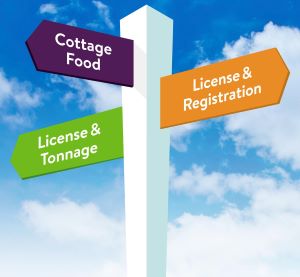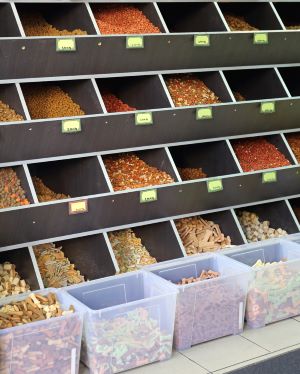NEW TO THE PET FOOD & SPECIALTY PET FOOD BUSINESS IN MINNESOTA
Minnesota's Commercial Feed Law applies to all commercial manufacturing and distribution activities involving feed, feed ingredients, and feed additives for all animals, including livestock, aquaculture, pets, and specialty pets.
There are multiple pathways available to sell pet food and specialty pet food in Minnesota. Depending on your business model, one or more of these pathways will apply to your operation
To sell dog or cat food that is not eligible for the Cottage Food Exemption, as well as to sell any specialty pet food, a Minnesota Commercial Feed License is required. For each unique product distributed, you will need to register or include it with an annual tonnage. Whether you register your products (see License and Registration section) or pay tonnage (see License and Tonnage section) is determined by package size.
Depending on your range of products and package sizes that you distribute, some products may require registration while others may qualify for tonnage payments.

Cottage Food
With a limited entry cost to do business, the Cottage Food Exemption allows individuals to make and sell certain non-potentially hazardous food and canned goods in Minnesota without a license. In addition to eligible human foods, cottage food registration now includes certain types of baked or dehydrated cat and dog treats. Specialty pet foods are not eligible for the exemption.

- Ingredients and final product must be safe for human consumption and for consumption by the intended species.
- You must be registered as a cottage food producer and renew annually.
- Products sold under the Cottage Food Exemption have an annual sales cap.
- Registered Minnesota cottage food producers may ship cottage pet treats in the mail or by commercial delivery to the end consumer
- The Cottage Food Producer Registration page contains details on ingredients, types of products that can be made, as well as steps to register.

Licensing and Registration
A commercial feed license is required for persons manufacturing and/or distributing commercial feed in or into the state of Minnesota unless the product is made and sold under the Cottage Food Exemption. This includes anyone inside or outside of Minnesota who has their name and address as a guarantor on the label of an animal feed product that is distributed in Minnesota. Feed licenses are unique to each location. Retail-only locations do not need a license. Additional commercial feed license information can be found on the License, Registration, and Tonnage page. 
- Registration is required when the product is sold exclusively in
- packages of 10 pounds or less.
- A Minnesota Commercial Feed License is required, with annual renewal.
- Registration fee is paid annually per unique product. Tonnage fees are not paid on these products.
- For fee schedules and more information visit the License, Registration, and Tonnage page.
 Licensing and Tonnage
Licensing and Tonnage
Similar to the license and registration requirements, a commercial feed license is needed to manufacture and/or distribute commercial feed in or into the state of Minnesota, unless the product is made and sold under the Cottage Food Exemption. This includes anyone inside or outside of Minnesota who has their name and address as a guarantor on the label of an animal feed product that is distributed in Minnesota. Feed licenses are unique to each location. Retail-only locations do not need a license. Additional information on commercial feed licenses can be found on the License, Registration, and Tonnage page.
- Your product is eligible for tonnage payment if distributed in packages greater than 10 pounds.
- A Minnesota Commercial Feed License is required, with an annual renewal.
- An inspection fee (also called tonnage fee) is paid annually on the total product weight distributed. Registration fees are not paid on these products.
- The same product distributed in packages sizes of both 10 pounds or less and over 10 pounds pay tonnage rather than registration fees.
- For fee schedules and more information visit the License, Registration, and Tonnage page.
Next Steps for Licensed Products
Finalize Your Recipe Using Acceptable Ingredients
- All ingredients must be defined by the Association of American Feed Control Officials (AAFCO), U.S. Food and Drug Administration (FDA) approved, sanctioned, or have an established history of safe use for the intended species.
- Ingredients must be included at safe levels, and for an approved purpose, for the intended species.
- Visit the AAFCO website to learn more about their role within the pet food industry.
Have Your Product Analyzed
The guaranteed analysis and caloric content can be determined by submitting a sample to a laboratory that can analyze pet foods. At a minimum, you should request crude protein, crude fat, crude fiber, ash, moisture, and a calorie calculation. Contact the lab you have chosen for directions on preparing and shipping your sample. Inform the lab your sample contains animal feed, not human food.
Develop Your Product Label
- The full set of labeling requirements for pet treats are outlined within the Minnesota Commercial Feed Law, Minnesota Commercial Animal Feed Rules, and the Minnesota Commercial Pet Food Rules.
- The AAFCO “Business of Pet Food” website contains helpful information on pet food labeling.
Find Helpful Resources at AAFCO
- The Association of American Feed Control Officials (AAFCO) is a collaborative association of state and federal feed control officials, feed industry members, and stakeholders which exists to promote a safe feed supply. Within AAFCO, the Minnesota Commercial Feed program promotes unity within system-based regulation, feed ingredient standards, and laboratory operations. To learn about AAFCO’s role within the animal food industry, watch this video at The Association of American Feed Control Officials - AAFCO.
- AAFCO produces an annual publication, the AAFCO Official Publication (OP), which contains the latest version of AAFCO-approved documents. A current OP is available for public viewing at the Minnesota State Law Library located inside the Minnesota Judicial Center (25 Rev Dr Martin Luther King Jr Blvd, St Paul, MN 55155).
- AAFCO provides free public access to Chapter Six the Official Publication (OP), where you can find official feed terms, common or usual ingredient names, and ingredient definitions.
- Visit AAFCO's Starting a Pet Food Business for information about pet food ingredients and labeling. If you will be distributing pet food in states other than Minnesota, you can access additional information on state's registration and licensing requirements from this page.
Once your license has been received, an inspection may be conducted.
Frequently Asked Questions
A commercial kitchen is not required to manufacture pet food in Minnesota. Pet food can be manufactured within the home if the food is manufactured in such a way that it remains safe.
If you manufacture, distribute, or your name appears on the label of a pet treat as the guarantor of the product, you need to have a Minnesota Commercial Feed License or operate within the Cottage Food Exemption.
Pet treats may be made and sold under the cottage food exemption program, the commercial feed program, or both programs, when the product meets the requirements of each respective program. Products that are sold under the cottage food law can also be labeled to meet the criteria for products sold under a commercial feed license. However, most products sold under a commercial feed license will not meet the basic requirements to be sold under the cottage food exemption. If you are planning to transition from operating under a cottage food exemption to operating under a commercial feed license or alternatively, the other way around, you will need to make sure you remain fully compliant with the requirements of each program during the period of transition.
Certain pet products such as bones, hides, and chews are exempt from license requirements, and therefore registration or tonnage requirements, when the product type and label meet the criteria detailed in the Exempt Product Policy. Pet treats that supply calories do not qualify.
Unless the product is made and sold as cottage food, all pet food products distributed exclusively in packages of ten pounds or less must be registered. Identical products offered in multiple package sizes are considered a single product for registration purposes. Tonnage fees must be paid for pet food products that are not subject to product registration.
For the purposes of registration, products offered in multiple package sizes with similar packaging differing by net content, but with identical products (same formula, shape, size, color, and flavor), may be considered a single product.
If a product is offered on a website, it is being offered into distribution in Minnesota, thereby requiring a license, along with registration or tonnage fee reporting. There are no additional requirements to sell your pet treats directly to consumers (in-person, online, through the mail, etc.) or to stores that will then resell them. However, if you choose to distribute your product in other states, you must determine each individual state’s requirements, as each state has its own set of feed regulations. Products registered as cottage food may be sold online, but they must either be picked up in person by the customer or personally delivered by the cottage food producer.
The State of Minnesota has the authority to inspect any facility operating within the state that qualifies for a feed license. A firm cannot opt-out of inspections.
We recommend doing a search for testing labs that routinely analyze pet foods. Minimally, you should request crude protein, crude fat, crude fiber, ash, and moisture. Ask the lab to determine the calorie content with a calculation specific to pets. Contact the lab you have chosen for directions on preparing and shipping your sample.
Use of the term, “organic” is allowed on pet food labels if the program and labeling requirements of the United States Department of Agriculture’s National Organic Program are met. These requirements can be found on the USDA National Organic Program website.
You may label your product as human-grade if it meets the Association of American Feed Control Officials (AAFCO) Guidelines for “Human Grade” Claims. You may be asked to provide documentation to support your claim, as outlined in the guideline. This guideline can be found in AAFCO’s Official Publication which can be purchased on the AAFCO website under the “Publications” section. Copies of the AAFCO Official Publication are also available for public viewing at the Minnesota State Law Library located inside the Minnesota Judicial Center (25 Rev Dr. Martin Luther King Jr Blvd, St Paul, MN 55155).
"Drug" is defined in the Minnesota Commercial Feed Law, 25.33, Subd. 8, as (1) any article intended for use in the diagnosis, cure, mitigation, treatment, or prevention of disease in animals other than humans; and (2) articles other than feed intended to affect the structure or any function of the animal body.
Drug claims, explicit or implied, are not allowed on pet food labels or labeling.
No. CBD, hemp, or any ingredients derived from hemp are not approved for use in animal feed, including pet food or treats, at this time. These ingredients have not yet successfully passed the safety and efficacy evaluations established by one of the recognized new animal feed ingredient approval processes.
You will need to ensure that the ingredients used are safe for the intended species. We recommend starting with the AAFCO website. Not just any ingredient can be used. Special consideration should be taken with ‘new’ or ‘novel’ ingredients, such as those that are sometimes used in dietary supplements for humans as these ingredients are not always safe for animals. There are methods available to have a new ingredient approved, but you must go through one of the channels available through AAFCO and/or the FDA. The cottage food program has different ingredient requirements for pet food which should be carefully reviewed.
Yes. The Minnesota Commercial Feed Law defines labeling as “all labels and other written, printed or graphic matter upon a commercial feed or any of its containers or wrapper or accompanying or supporting such commercial feed”. Therefore, labeling includes websites, and their content is subject to the Minnesota Commercial Feed Law, Animal Feed Rules, and Pet Food Rules.

